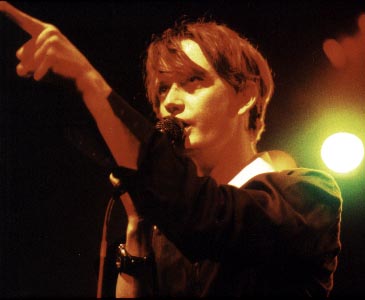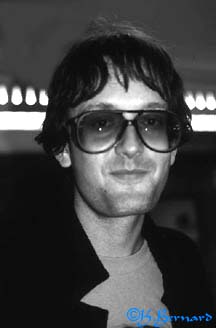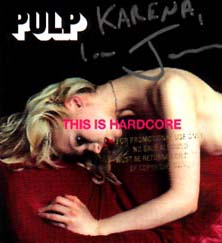

This is Hardcore:
The Best Album of 1998
story by Michael Pelusi
live photo: by Eddie Malluk
below: by k. bernard

hen John Lennon sang "A working class hero is something to be," it was
an aspiration, not a boast. Jarvis Cocker, lead singer of the British band
Pulp, however, might take that remark to task. Cocker was a working-class hero.
In
1995, after some 12 years of struggling, the band released "A Different Class",
a stunning tour de force examining working class life, sex and desperation. But that
album turned him into a superstar (in the U.K.) and a cult hero for the disaffected
(in the U.S.).
Had
Cocker followed up"'Class" with more pungent observations on poverty and
ennui, the work might have been witty, catchy and accurate, but they would have dishonest.
He knows he can't be the voice of the working class anymore now that he's a star
-- but he's still not happy. He's still sex and love-starved, but now he's in his
mid-thirties, so when he feels the bones shift and ache in his awkward six-foot-plus
frame, he worries that it's not due to a lust for life anymore. So, what listeners
the world over received from the band in April of 1998 was a bit of a shock.
Had Cocker followed
up"'Class" with more pungent observations on poverty and ennui, the work
might have been witty, catchy and accurate, but they would have dishonest. He knows
he can't be the voice of the working class anymore now that he's a star -- but he's
still not happy.

On
the surface, "This is Hardcore" (Island) contained much of the 'classic'
Pulp formula: an ironically lurid approach to sex, devastatingly clever character
assassinations, chunky glam-rock riffs, John Barry-inspired orchestrations. However,
even a slightly less-than-cursory listen to the album revealed that there was something
else going on.
Those funny/creepy bedroom ballads seemed to have trouble telling the difference
between the two. The character assassinations seemed more self-directed. And those
chewy guitars and sweet orchestras didn't immediately yield irresistible singles
like Class's "Common People" and "Disco 2000."
Maybe
this explains why, at least here in America, the hype machine that Island Records
used to fanfare Hardcore eventually died out, and why the band only included three
cities on its American tour.
This is Hardcore was, simply put, too dark and complex to ever reap the band any
significant Stateside success beyond its rabid cult and allegiance of critics.
The
album opens with the paranoia opus "The Fear." As slithery guitar lines
creep to the fore, Cocker states Pulp's modus operandi: "This is our/Music from
a Bachelor's Den' / The sound of loneliness turned up to ten." Gradually a sleazy
rhythm section enters, followed by a Dark Side of the Moon-esque female chorus, and
soon we're listening to a meta-song for all the lonely losers who've identified with
one too many ballads. "When you can't even define what is that you are frightened
of / This song will be here." But the track avoids cynicism through the catch
in Cocker's voice. You can tell he wrote this song so he, too, could have something
to sing along to.
In
fact, no sooner than the next track, "Dishes," does Cocker drop the affected
distance, and give the listener a glimpse into his own isolation. "I am not
Jesus though I have the same initials / I am the man who stays home and does the
dishes." Cocker will address unspeakable aloneness even more bluntly later on
the album on "TV Movie." "And I can't think of a way to get through
this pain / To be happy again to make it all alright."
...the brilliant
title track [is] a dark crawl through primal carnality that makes Nine
Inch Nails' "Closer" sound like The Captain and Tenille...

Cocker
avoids sounding self-pitying throughout the album by knowingly alternating between
irony and self-revelation. However, when you get to the brilliant title track, the
line between the two blurs significantly. It's a dark crawl through primal carnality
that makes Nine Inch Nails' "Closer" sound like The Captain and Tenille;
or it's a decadent porn aficionado's diary excerpt.
At
any rate, it is a compelling look at lust unhinged and sex - real and imagined -
like Elvis Costello's classic, creepy "I Want You" decked out in plush
carpeting and mood lighting. Cocker lays on the sleazy come-ons and compliments,
before hitting the climax: "Oh this is hardcore / There is no way back for you
/ Oh, this is hardcore / This is me on top of you / And I can't believe that it took
me this long." Is it for real? Is it a movie? Is he really serious?
Less
intense tracks, nevertheless, sink their observations equally deep. The beautiful
ballad "A Little Soul" cops the "Tracks of My Tears" riff as
Cocker plays a shit-of-a-dad who looks to his son and worries what he taught him.
"You look like me but please don't turn out like me." "Party Hard"
and "I'm a Man" sneer at decadent lifestyles with dead-on accuracy and
laconic humor. And on "Help the Aged," Cocker says what few other rock
stars would ever dare: "If you look hard behind the lines upon their face /
you may see where you are headed and it's such a lonely place."
Cocker, more than
any other British popster to come of age in the past few years, seems poised to assume
the kind of status given to the likes of Ray Davies, Elvis Costello and Morrissey
I
don't mean to exclude the other members of Pulp from this piece, but it's hard to
ever stop thinking about Cocker. Devastatingly clever and endlessly fascinating,
Cocker, more than any other British popster to come of age in the past few years,
seems poised to assume the kind of status given to the likes of Ray Davies,
Elvis Costello and Morrissey. Not because he's pilfered their riffs,
but because he and the rest of Pulp, alone, have the kind of vision - universal enough
to be relevant in more than one culture, personal enough to catch the ears of other
sensitive loners the world over - that lingers after magazine covers and album figures
get stuffed in libraries.
1999 ©TransACTION
Inc. All Rights Reserved

More CD Reviews




![]()


![]()